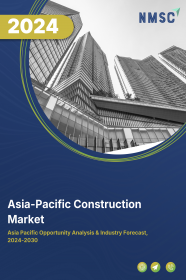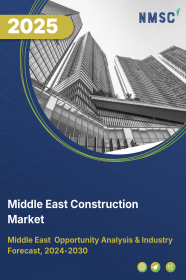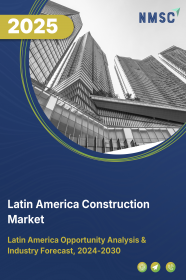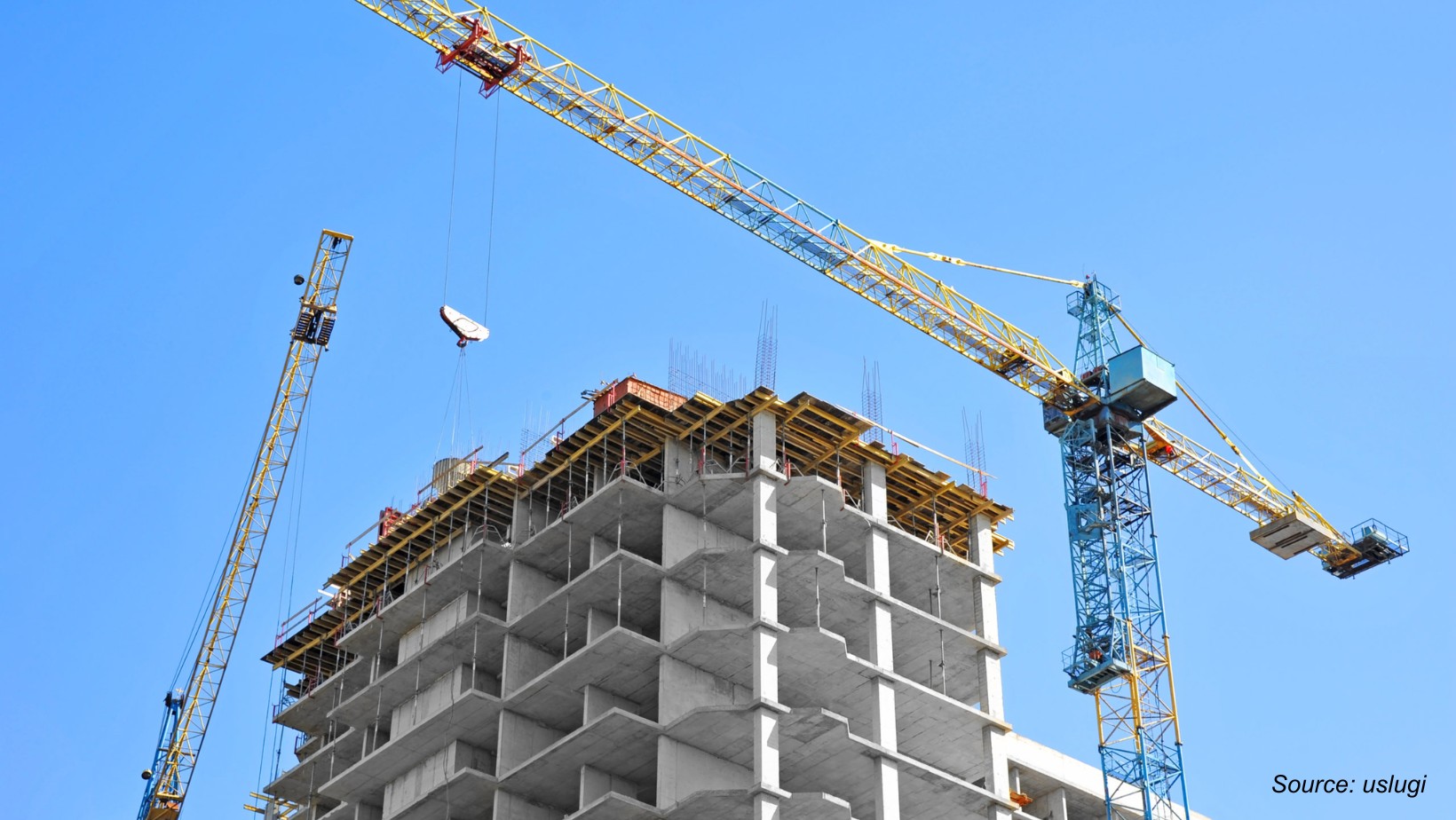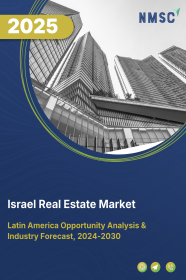
Israel Real Estate Market by Property Size (Small (<500 sq. ft.), Medium (500–2000 sq. ft.), Large (2000+ sq. ft.)), Property Type (Residential, Commercial, Land, Industrial), by Business Type (Buying, Selling, Leasing, Renting and Real Estate Investment), by Ownership (Owner-Occupied Properties, Rental Properties, Co-ownership), and by Property Value (Affordable Housing, and Others) by End User (Individual Buyers, and Others) – Opportunity Analysis and Industry Forecast, 2025–2030.
Industry: Construction & Manufacturing | Publish Date: 26-Aug-2025 | No of Pages: 183 | No. of Tables: 144 | No. of Figures: 89 | Format: PDF | Report Code : CM1233
Market Definition
The Israel Real Estate Market size was valued at USD 85.3 million in 2023, and is predicted to reach USD 154.9 million by 2030, at a CAGR of 8.9% from 2024 to 2030.
The real estate industry constitutes a multifaceted market involving the acquisition, development, and management of residential and commercial properties. This expansive sector includes residential real estate, catering to individuals and families, as well as commercial and industrial real estate, focused on business operations and manufacturing. Real estate development involves the creation and enhancement of properties, while real estate investment encompasses acquiring properties for financial gain.
Additionally, a range of professional services, such as those provided by real estate agents and property managers, contributes to the industry's dynamics. Influenced by economic trends, demographic shifts, and regulatory factors, the real estate market is a complex landscape where various stakeholders engage in activities that shape urban environments, support economic growth, and provide investment opportunities.
Expansion of Transport and Smart Infrastructure Networks Accelerates Development
Recent large‑scale investments in rail, light rail, and highway projects are reshaping Israel’s urban footprint and unlocking new development corridors. Extensions of the Tel Aviv Light Rail, upgrades to the Jerusalem–Tel Aviv intercity rail, and major highway widenings have significantly reduced commute times and spurred demand for residential and commercial projects along these transit axes. Local municipalities are coupling these transport upgrades with smart-city initiatives—such as IoT‑enabled street lighting and real‑time traffic management—to enhance urban living standards and attract both investors and end‑users.
These infrastructure enhancements also drive a shift toward mixed‑use precincts that integrate housing, retail, and office space in proximity to transit hubs. Developers are targeting infill sites near new stations for higher‑density projects, capitalizing on the growing preference for walkable, connected neighborhoods. For investors, these transit‑oriented developments promise stronger rental yields and faster asset appreciation, as tenants increasingly prioritize accessibility, digital amenities, and integrated mobility solutions.
Surge in Foreign Investments and Global Capital Inflows Boosts Market Liquidity
Israel’s reputation as a technology and innovation hub continues to attract significant cross‑border real estate investment, diversifying liquidity sources and broadening the buyer base. Sovereign wealth funds, pension pools, and international private equity firms are deploying capital into trophy office assets in Tel Aviv, logistics parks near Haifa port, and luxury residential towers along the Mediterranean coast. Their entry not only elevates transaction volumes but also raises governance standards and due‑diligence practices across the sector.
Alongside institutional investors, high‑net‑worth individuals from Europe, North America, and Asia are increasingly purchasing secondary homes and residential rental properties in Israel’s fast‑growing peripheries. This influx of global capital is encouraging domestic developers to adopt internationally recognized best practices—covering everything from ESG reporting to transparency in sales contracts—and is fueling the rise of professionally managed, income‑yielding real estate vehicles that cater to both local and overseas investors.
Escalating Construction Costs and Labor Shortages Impact Project Viability
Recent surges in global material prices—particularly steel, concrete, and imported energy-intensive components—have driven up the cost of new developments across Israel. At the same time, chronic shortages of skilled construction labor and intensified competition for talent have pushed wages higher. Together, these factors are squeezing developer margins, forcing many to delay or downsize planned projects to maintain financial viability.
The combined effect of inflated input costs and workforce constraints also feeds through to end‑user pricing, exacerbating affordability pressures and slowing sales velocity in both primary and secondary markets. Developers are increasingly compelled to adopt modular or prefabricated construction methods and pursue longer‑term bulk procurement agreements to stabilize costs—but these measures only partially mitigate the underlying supply‑chain volatility and staffing bottlenecks that continue to restrain sector growth.
Integrated Senior and Health‑Focused Real Estate Solutions to Serve an Aging Population
Israel’s demographic shift toward an older population is creating a compelling demand for purpose‑built senior living and health‑oriented communities. Modern seniors seek residences that combine residential comfort with on‑site healthcare, wellness amenities, and social spaces that foster community engagement. This trend is prompting developers to design age‑inclusive neighborhoods offering assisted‑living units, rehabilitation centers, and integrated telemedicine infrastructure to support independent living.
For real estate investors and operators, senior‑focused developments present a resilient, countercyclical asset class with strong occupancy fundamentals. Partnerships with healthcare providers and technology firms can enhance service offerings—such as remote monitoring, digital care coordination, and wellness programming—while specialized financing structures and long‑term leases deliver stable cash flows. As Israel prioritizes eldercare in its social policy agenda, stakeholders who pioneer holistic senior housing solutions will unlock a rapidly growing segment of the market
Competitive Landscape
The market players operating in the Israel real estate market include Azrieli Group Ltd., Melisron Ltd., Amot Investments Ltd., MIVNE REAL ESTATE (K.D.) LTD., Gav‑Yam Lands Corp. Ltd., Y.H. Dimri Construction & Development Ltd., Alony‑Hetz Properties & Investments Ltd., Aura Investments Ltd., BIG Shopping Centers Ltd., Levinstein Properties Ltd., Israel Canada (T.R.) Ltd., Summit Real Estate Holdings Ltd., Africa Israel Residences Ltd., Electra Real Estate Ltd., and G City Ltd. (formerly Gazit‑Globe Ltd).
Israel Real Estate Market Key Segments
By Property Size
-
Small (<500 sq. ft.)
-
Medium (500–2000 sq. ft.)
-
Large (2000+ sq. ft.)
By Property Type
-
Residential
-
Apartments/Flats
-
Single-Family Homes
-
Multi-Family Homes
-
Condominiums
-
Townhouses
-
Vacation Homes
-
-
Commercial
-
Office Spaces
-
Retail Spaces
-
Co-working Spaces
-
Warehouses
-
-
Land
-
Urban Plots
-
Suburban/Rural Plots
-
-
Industrial
-
Manufacturing Plants
-
Distribution Centers
-
Data Centers
-
By Business Type
-
Buying
-
Selling
-
Leasing
-
Renting
-
Real Estate Investment
-
Direct Property Investment
-
Real Estate Investment Trusts (REITs)
-
By Ownership
-
Owner-Occupied Properties
-
Rental Properties
-
Co-ownership
By Property Value
-
Affordable Housing
-
Luxury Housing
-
Ultra-Luxury Housing
By End User
-
Individual Buyers
-
First-time Homebuyers
-
Repeat Buyers
-
Luxury Buyers
-
Seniors/Retirees
-
-
Business Entities
-
Startups
-
SMEs
-
Large Corporations
-
-
Government
-
Civic Projects
-
Affordable Housing Initiatives
-
-
Institutional Investors
Key Players
-
Azrieli Group
-
Gazit-Globe
-
Amot Investments
-
Melisron Ltd.
-
Ashtrom Group
-
Tidhar Group
-
Caesarea Assets Corporation
-
BIG CEE
-
Prashkovsky Investments
-
Vitania Ltd
-
Daon Group Real Estate
-
RE/MAX Israel
-
Carasso Real Estate Ltd.
-
Mivne Group
-
Sunset
REPORT SCOPE AND SEGMENTATION:
|
Parameters |
Details |
|
Market Size in 2023 |
USD 85.3 Million |
|
Revenue Forecast in 2030 |
USD 154.9 Million |
|
Growth Rate |
CAGR of 8.9% from 2024 to 2030 |
|
Analysis Period |
2023–2030 |
|
Base Year Considered |
2023 |
|
Forecast Period |
2024–2030 |
|
Market Size Estimation |
Million (USD) |
|
Growth Factors |
|
|
Companies Profiled |
15 |
|
Market Share |
Available for 10 companies |
|
Customization Scope |
Free customization (equivalent up to 80 working hours of analysts) after purchase. Addition or alteration to country, regional, and segment scope. |
|
Pricing and Purchase Options |
Avail customized purchase options to meet your exact research needs. |

















 Speak to Our Analyst
Speak to Our Analyst



